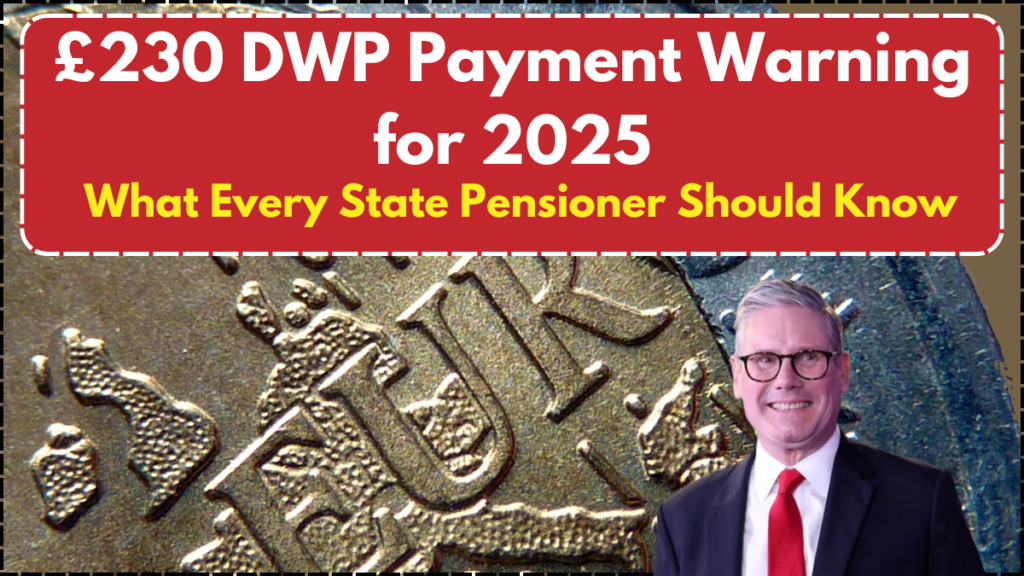Thousands of UK pensioners, predominantly women, have been hit with a disturbing revelation in April 2025. The Department for Work and Pensions (DWP) has acknowledged that longstanding administrative oversights have led to systemic underpayments for over 230,000 individuals, with a total estimated shortfall of £835 million.
The majority of those affected are elderly citizens, many of whom were entitled to increased state pensions due to marital status, widowhood, or age but were never awarded the appropriate sums. The issue, now widely referred to as the “£230 DWP Payment Warning,” originated from systemic failures in the legacy pension system, revealing gaps that date back several decades.

Who Has Been Most Affected?
A detailed DWP review has exposed that nearly 237,000 pensioners, primarily older women, were underpaid. The error disproportionately affected:
- Married women who should have seen pension increases when their husbands retired.
- Widows who were entitled to higher payments upon their spouse’s death.
- Individuals over 80, eligible for Category D pensions regardless of contributions, who didn’t receive appropriate amounts.
These errors persisted due to the heavy reliance on manual processing, where changes in marital or survivor status were not always captured or updated in a timely manner. Many affected individuals were unaware of their entitlement to higher payments.
Key Insights into the DWP Underpayment Scandal
| Key Information | Details (As of April 2025) |
|---|---|
| Total Pensioners Affected | Approximately 237,000 |
| Groups Most Affected | Married women, widows, and over-80s (Category D) |
| Total Estimated Arrears Owed | £835 million |
| Average Repayment (Married) | £5,173 |
| Average Repayment (Widows) | £12,383 |
| Average Repayment (Over-80s) | £2,192 |
| Correction Programme Launched | January 2021 |
| Amount Repaid by April 2025 | £571 million to over 150,000 pensioners |
| How to Check Your Status | Contact Pension Service or use GOV.UK tools |
| Official Contact Method | Via GOV.UK or DWP helpline |
What Caused the Underpayments?
The root of the problem lies in the outdated pre-2016 pension infrastructure, which required manual updates for any pension changes. When a woman’s entitlement increased—such as when a spouse retired or passed away—the system often failed to adjust her payments accordingly. In many cases, these individuals were not informed about their eligibility for higher payouts.
This issue also underscores a deeper gender inequality within the pension system. Many affected women had limited National Insurance contributions due to unpaid caregiving roles. Although the system was designed to provide spousal and survivor benefits, flawed processes denied them the support they deserved.
How Much Could You Be Owed?
Estimates suggest the following average arrears per group:
- Married women: Approximately £5,173 per individual (43,000 cases)
- Over-80 pensioners: Around £2,192 (32,000 cases)
- Widows: An average of £12,383 each (21,000 cases)
Some pensioners have reportedly been shortchanged by as much as £40,000, particularly where decades of entitlement adjustments were missed. This shortfall has not only impacted personal finances but also caused emotional distress for many families.
What Is the Government Doing Now?
To address the situation, the DWP initiated a correction programme in early 2021. As of April 2025, the department has reimbursed over £571 million to more than 150,000 pensioners. The DWP has committed to continuing these reviews until all owed payments are settled.
A government spokesperson stated that rectifying these underpayments remains a top priority, with systems now being modernised to reduce reliance on manual intervention.
How to Find Out If You’re Affected
If you suspect that you or a deceased family member may have been underpaid, consider these steps:
- Visit the official GOV.UK website and contact the Pension Service.
- Use the State Pension Forecast Tool to compare past and current payments.
- Review your National Insurance contributions via your tax account.
- Consult with organisations such as Age UK or Pension Wise.
- If managing the estate of a deceased pensioner, check if the estate is eligible for arrears.
Although DWP is proactively identifying affected individuals, taking initiative can help expedite the process or ensure no case is missed.
Public Reaction and Advocacy
This underpayment revelation has triggered outrage among campaigners and former officials. Sir Steve Webb, ex-pensions minister and policy partner at LCP, labelled it “one of the most serious pension oversights in UK history.” Advocacy groups are pushing for automated updates and better public education on pension entitlements.
Calls for transparency, clearer communication, and compensation are intensifying as thousands remain unaware of the financial support they are rightfully owed.
Conclusion
The £230 DWP underpayment warning serves as a stark reminder of the consequences of outdated systems and insufficient oversight. With more than £835 million still being reconciled, the scandal has affected lives across the UK, especially among older women who depended on these payments. Staying informed and proactive is essential, whether for yourself or a loved one.
FAQs
How do I know if I’ve been underpaid by the DWP?
You can check by contacting the Pension Service through the GOV.UK website or by calling the DWP directly. You can also use pension forecast tools to identify any discrepancies.
What happens if the underpaid person is deceased?
If the individual has passed away, their estate may still be entitled to receive the back payment. It’s important to inform the DWP to trigger a case review.
Do I need to apply for a review?
No formal application is required, but contacting the Pension Service may accelerate the review process or highlight overlooked cases.
Is everyone who is owed money going to get paid?
The DWP has committed to reviewing all relevant cases, but given the volume, it may take time. Being proactive ensures that your case is not missed.
What if I received a letter from the DWP?
If you’ve received communication from the DWP, follow the instructions provided. These letters typically include information on how your case is being reviewed or resolved.
For More Information Click Here
Pari is a passionate writer known for captivating stories that blend imagination and reality. Inspired by travel, history, and everyday moments, Pari crafts narratives that resonate deeply with readers.




